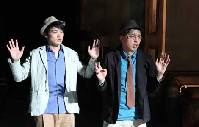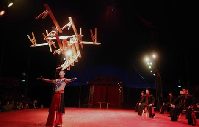A stage for precious words
By Han Bingbin ( China Daily ) Updated: 2013-12-20 09:48:11
Wang delivers the climax during a dialogue between Fu and his old rival, prime minister Li Si, when Li was on his way to execution upon the collapse of the Qin Dynasty. Fu revealed his secret by reciting a long excerpt from Shang Shu. With his trembling voice, the respect for history and the pride of culture becomes even more touching when they're mixed with guilt, remorse or whatever emotions the listeners think there may be.
Fu's feelings are further complicated by a little irony in the end. The following Western Han Dynasty (206 BC-24 AD) paid supreme tribute to Confucianism while banning all other schools of thought.
"Culture is as diversified as life. It's not right to respect only one school of thought in a specific time. So this is not what Fu Sheng wanted to see in the end," Wang says.
The whole historical drama is narrated in a very modern spirit. The sense of history is conveyed by a stage designed like an archaeological site with bamboo slips and fragments of bones scattered around. In the book-burning scene, the fire is represented by a big piece of red cloth that falls from the sky. All the supporting roles are played by the "singing team" wearing different identity-suggesting masks. In addition to speaking lines, they also dance and sing to externalize the characters' feelings.
For example, after Fu's son is taken away by the soldiers, Fu kneels on the floor and constantly shakes his head in agony, suggesting one of the fortes of director Wang - seeking inspiration from Peking Opera.
With these artistic experiments, the riveting story and the cultural attitude, Wang admits that it's a play of ambition.
"I want it to be a play of weight, a play that will last through time," he says.
If you go:
7:30 pm, Dec 25-29, Jan 25.
National Theater of China, 277 Guang’anmenwai Dajie (Street), Xicheng district, Beijing.
4006101101.
|
|
|
|
|
|
|
|























 Raymond Zhou:
Raymond Zhou: Pauline D Loh:
Pauline D Loh: Hot Pot
Hot Pot Eco China
Eco China China Dream
China Dream China Face
China Face





